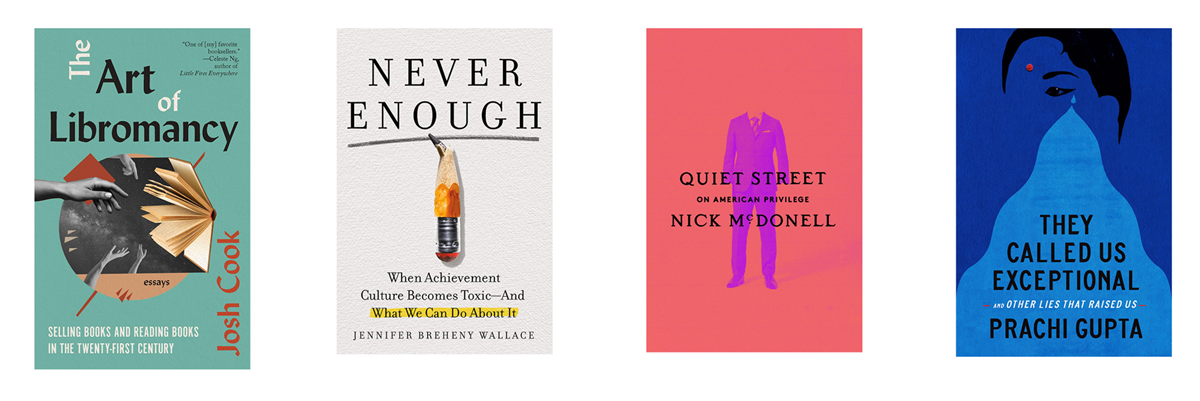New Releases | August 22, 2023
August 22, 2023
Excellent new books are brought into the world every single week. Here at Porchlight, we track them all and elevate four new releases we are excited about as they hit bookstore shelves on Tuesday morning.
The books are chosen by Porchlight's Managing Director, Sally Haldorson, and the marketing team: Dylan Schleicher, Gabbi Cisneros, and Jasmine Gonzalez. (Book descriptions are provided by the publisher unless otherwise noted.) This week, our choices are:

Jasmine’s pick: The Art of Libromancy: On Selling Books and Reading Books in the Twenty-first Century by Josh Cook, Biblioasis
"If books are important to you because you're a reader or a writer, then how books are sold should be important to you as well. If it matters to you that your vegetables are organic, your clothes made without child labor, your beer brewed without a culture of misogyny, then it should matter how books are made and sold to you."
With Amazon’s growing power in both bookselling and publishing, considering where and how we get our books is more important now than ever. The simple act of putting a book in a reader’s hands—what booksellers call handselling—becomes a catalyst for an exploration of the moral, financial, and political pressures all indie bookstores face. From the relationship between bookselling and white supremacy, to censorship and the spread of misinformation, to the consolidation of the publishing industry, veteran bookseller and writer Josh Cook turns a generous yet critical eye to an industry at the heart of American culture, sharing tips and techniques for becoming a better reader and, of course, recommending great books along the way.
Dylan’s pick: Never Enough: When Achievement Culture Becomes Toxic—and What We Can Do About It by Jennifer Breheny Wallace, Portfolio
In the ever more competitive race to secure the best possible future, today’s students face unprecedented pressure to succeed. They jam-pack their schedules with AP classes, fill every waking hour with resume-padding activities, and even sabotage relationships with friends to “get ahead.” Family incomes and schedules are stretched to the breaking point by tutoring fees and athletic schedules. Yet this drive to optimize performance has only resulted in skyrocketing rates of anxiety, depression, and even self-harm in America’s highest achieving schools. Parents, educators, and community leaders are facing the same quandary: how can we teach our kids to strive towards excellence without crushing them?
In Never Enough, award-winning reporter Jennifer Breheny Wallace investigates the deep roots of toxic achievement culture, and finds out what we must do to fight back. Drawing on interviews with families, educators, and an original survey of nearly 6,000 parents, she exposes how the pressure to perform is not a matter of parental choice but baked into our larger society and spurred by increasing income inequality and dwindling opportunities. As a result, children are increasingly absorbing the message that they have no value outside of their accomplishments, a message that is reinforced by the media and greater culture at large.
Through deep research and interviews with today’s leading child psychologists, Wallace shows what kids need from the adults in the room is not more pressure, but to feel like they matter, and have intrinsic self-worth not contingent upon external achievements. Parents and educators who adopt the language and values of mattering help children see themselves as a valuable contributor to a larger community. And in an ironic twist, kids who receive consistent feedback that they matter no matter what are more likely to have the resilience, self-confidence, and psychological security to thrive.
Packed with memorable stories and offering a powerful toolkit for positive change, Never Enough offers an urgent, humane view of the crisis plaguing today’s teens and a practical framework for how to help.
Sally’s pick: Quiet Street: On American Privilege by Nick McDonell, Pantheon
Nick McDonell grew up on New York City’s Upper East Side, a neighborhood defined by its wealth and influence. As a child, McDonell enjoyed everything that rarefied world entailed—sailing lessons in the Hamptons, school galas at the Met, and holiday trips on private jets. But as an adult, he left it behind to become a foreign correspondent in Iraq and Afghanistan.
In Quiet Street, McDonell returns to the sidewalks of his youth, exhuming with bracing honesty his upbringing and those of his affluent peers. From Galápagos Island cruises and Tanzanian safaris to steely handshakes and schoolyard microaggressions to fox-hunting rituals and the courtship rites of sexually precocious tweens, McDonell examines the rearing of the ruling class in scalpel-sharp detail, documenting how wealth and power are hoarded, encoded, and passed down from one generation to the next. What’s more, he demonstrates how outsiders—the poor, the nonwhite, the suburban—are kept out.
Searing and precise yet ultimately full of compassion, Quiet Street examines the problem of America’s one percent, whose vision of a more just world never materializes. Who are these people? How do they cling to power? What would it take for them to share it? Quiet Street looks for answers in a universal experience: coming to terms with the culture that made you
Gabbi’s pick: They Called Us Exceptional: And Other Lies That Raised Us by Prachi Gupta, Crown
How do we understand ourselves when the story about who we are supposed to be is stronger than our sense of self? What do we stand to gain—and lose—by taking control of our narrative? These questions propel Prachi Gupta’s heartfelt memoir, and can feel particularly fraught for many immigrants and their children, who live under immense pressure to belong in America.
Prachi’s family embodied the American Dream: a doctor father and a nurturing mother who raised two high-achieving children with one foot in the Indian American community, the other in Pennsylvania’s white suburbia. But their belonging was predicated on a powerful myth: that Asian Americans have perfected the alchemy of middle-class life, raising tight-knit, ambitious families that are immune to hardship. Molding oneself to fit this perfect image often comes at a steep, but hidden, cost. In They Called Us Exceptional, Gupta articulates the dissonance, shame, and isolation of being upheld as an American success story while privately navigating traumas invisible to the outside world.
Gupta addresses her mother throughout the book, weaving a deeply vulnerable personal narrative with history, postcolonial theory, and research on mental health to show how she slowly made sense of her reality and freed herself emotionally and physically from the pervasive, reductive myth that had once defined her. But tragically, the act that liberated Gupta was also the act that distanced her from those she loved most. By charting her family’s slow unraveling and her determination to break the cycle, Gupta shows how traditional notions of success keep us disconnected from ourselves and another—and passionately argues why we must orient ourselves toward compassion over belonging.
WHAT WE'VE BEEN READING AT HOME
 "Rememberings by Sinead O'Connor. A tumultuous autobiography from one of the most controversial artists of the 20th century. A peek into her abusive childhood and how she survived by splitting herself into different identities. Pretty powerful stuff here."
"Rememberings by Sinead O'Connor. A tumultuous autobiography from one of the most controversial artists of the 20th century. A peek into her abusive childhood and how she survived by splitting herself into different identities. Pretty powerful stuff here."
—Roy Normington, Senior Customer Service Specialist






